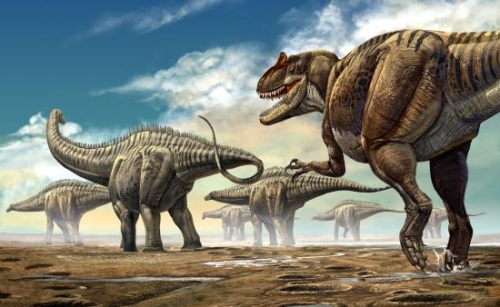So now, well, we are looking at other… we are, we are trying to understand the biology of sauropods, comparing their fossils to the anatomy of modern animals to get a better idea of how they lived.
现在,我们在看其它……我们正在努力弄明白蜥脚类动物的生物性质,把它们的化石和现代动物的解剖结构作比较,以更好地理解它们是怎样生存的。
What we've found is that sauropods were experts at conserving energy.
我们发现,蜥脚类动物很擅长储能。
They had enormous stomach capacity, the ability to digest food over a long period, converting it to energy at a slower pace, saving it for later.
它们的胃容量非常大,能够长时间消化食物,以缓慢的速度把食物转化成能量,供以后利用。

For animals with small stomachs, it takes lots of energy to constantly look for food and then digest it.
对胃容量小的动物来说,它们要不断觅食并消化食物,这也是非常耗能的。
With larger stomachs and slower digestion, you don't need as much energy. Joseph?
有了更大的胃且消化得更慢,你就不需要这么多能量了。约瑟夫?
Does… do scientists actually know about sauropods from looking at… I mean, how much can we actually learn looking at some ancient bones compared to all we can learn from modern animals?
科学家们了解蜥脚类动物的方式是……我是说,和我们能从现代动物身上学到的知识相比,我们究竟能从那些古老的骨头中学到什么?
And, comparisons between animals that lived millions of years apart?
把相隔了几百万年的动物放在一起对比?
Well, it just seems… more like guessing.
这看起来更像是靠猜的。
There's always some guesswork when studying extinct animals.
在研究已经绝种的动物时,总会有些猜测成分的。
But that's exactly what leads to discoveries, a hypothesis, a type of guess is made.
但一个假说,一种猜测也正导致了重大发现。
We test the hypothesis by looking for evidence to support it.
我们通过寻找证据支持来测试这个假说。
Then some questions are answered, which may lead to new questions.
有些问题解决了,可能会引发新的问题。
For example, let's look at one of these comparisons.
举个例子,看看其中一组比较。
We know sauropods couldn't chew food.
我们知道蜥脚类动物无法咀嚼食物。
Their skulls show they had no chewing muscles.
它们的头骨显示,它们不具有咀嚼肌。
Lots of modern animals, like birds and reptiles, also can't chew food.
很多现代动物,像鸟类和爬行动物,也不能咀嚼食物。
They need to swallow it whole.
它们得整个吞下去。
But modern animals have an interesting aid for digesting food.
但现代动物有个有趣的帮手,能帮它们消化食物。
They swallow stones, stones that are used to help grind up the food before it's actually digested in the stomach.
它们会吞下石头,在食物真正进入胃部被消化以前,这些石头有助于把食物磨碎。
These stones are called gastroliths.
这些石头称为胃石。










